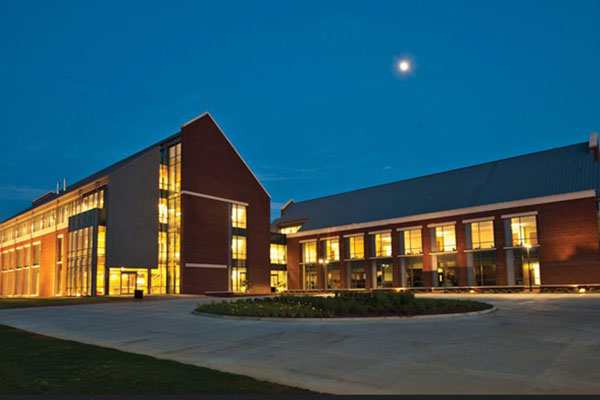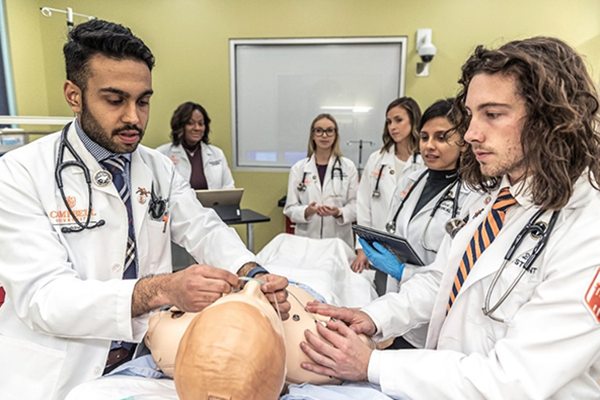Campbell University Jerry M. Wallace School of Osteopathic Medicine - CUSOM
Lillington, North Carolina
Main Campus
General Information
Mission Statement
Closest City Raleigh, NC (the state capital)
Campus Setting
RuralFacilities
CUSOM, located on 20 acres adjacent to Campbell University’s golf course, consists of 96,500 square feet of classroom, laboratory, clinical simulation, small group, student activity and administrative office space. The design fits comfortably with the architectural character that defines the Campbell University campus. The building brings medical students, faculty, staff, and administration together in a state-of-the-art facility.
CUSOM students and faculty have access to more than 10,000 square feet of dedicated research space, with facilities in Smith Hall just a short walk from the medical school. In addition, students have access to the 110,000-square-foot Oscar N. Harris Student Union on main campus, less than a 5-minute drive from CUSOM.
Student Residence Options
Student clubs and organizations are a very important part of CUSOM. The service performed by members of student organizations benefits not only the community and the region, but also the members, as they gain valuable knowledge, skills, and experience. CUSOM has over 30 clubs and organizations in which students may participate.
CUSOM’s Department of Behavioral Health provides support and counseling services to students for concerns including, but not limited to, burnout, fatigue mitigation, anxiety, depression, academic difficulty and performance, study strategies, relationship/family difficulties, stress management, and adjustment to illness and lifestyle changes.
In addition to traditional advising and mentorship by biomedical and clinical faculty, the CUSOM Academic Center for Excellence (ACE) manages academic support programs and learning services including, but not limited to, peer learning partners, study skill development workshops, individual academic coaching, and faculty advising support. The CUSOM ACE is also responsible for designing and leading activities and programs to assist matriculating students develop study skills and techniques for achieving academic success.
At its April 11, 2024 meeting, the Commission of Osteopathic College Accreditation (COCA) granted the Campbell University Jerry M. Wallace School of Osteopathic Medicine (CUSOM) Accreditation with Exceptional Outcome status, with the next accreditation review scheduled for 2034. Accreditation with Exceptional Outcome status is the highest level of accreditation awarded by the COCA at this time.
In addition, Campbell University is accredited by the Southern Association of Colleges and Schools Commission on Colleges (SACSCOC) and is one of only five private universities in North Carolina to achieve Level VI accreditation, the highest level possible.
University Affiliation(s) Campbell University
-
2024-2025
Academic Year Enrollment
Total Medical School Enrollment
638
Total Male
280
Total Female
358
Total Other
0
First-Year Matriculants
163
First-Year Male Matriculants
76
First-Year Female Matriculants
87
First-Year Other Matriculants
0
Matriculants In-State
76
Matriculants Out-of-State
87
Self-Reported Race/Ethnicity
American Indian/Alaska Native
0%
Asian
16.0%
Black/African American
3.1%
Hispanic/Latino
6.7%
Native Hawaiian/Pacific Islander
0%
White
69.3%
Multiple Races
3.7%
Undisclosed
1.2%
Majors of First-Year Matriculants
Science Majors
84.0%
Non-Science Majors
16.0%
Graduate Degrees
14.7%
Overview
Private Institution
Non-Profit
Campbell University
Institutional Affiliation
2011
Year Founded
Rural
Campus Setting
Campus Contact
Campbell University Jerry M. Wallace School of Osteopathic Medicine - CUSOM
Address
(855) 287-6613 [Toll Free] or (910) 893-1770
Phone
Website
Admissions Office
Curricular Offerings
CUSOM utilizes a carefully planned systems-based curriculum incorporating traditional lectures, interactive case-based presentations, small group clinical cases, simulation and laboratory experiences, as well as standardized patient encounters to facilitate osteopathic clinical integration. Vertical and horizontal integration facilitate linkage between clinical concepts across the four years of the curriculum.
Vertical integration refers to the interweaving of clinical skills and knowledge into basic science and system-based courses, reinforcing basic science concepts as they apply during clinical rotations. Horizontal integration identifies concepts or skills, particularly those that are clinically relevant, which span across the basic sciences, and uses them as an integrated focus for presentations, clinical scenarios, and course materials.
The CUSOM curriculum in Years 1 and 2 is integrated to provide both a strong core of biomedical principles and a robust foundation in clinical sciences, including osteopathic principles and practice, clinical skills, and professionalism. Content is typically delivered in 10-week Blocks over four semesters, with a one-week break between each Block.
Blocks One and Two cover fundamental basic sciences through a set of courses designed to provide optimal integration while providing clinical relevance and clarity on discipline-specific concepts.
Blocks Three through Eight integrate basic and clinical sciences using an organ system approach, covering the clinical presentations, underlying pathophysiology, diagnosis, and management of common disease states.
Morning lecture/discussions are complemented by afternoon labs and skills sessions and include embedded Study Time. Osteopathic Manipulative Medicine (OMM) and other clinical skills are taught longitudinally throughout the first two years in a progression designed to integrate with and provide seamless entry into third- and fourth-year clinical rotations. Team-teaching by physicians and basic scientists promotes integrated learning. To optimize student learning and well-being, CUSOM incorporates Study Time into the weekly schedules, enabling students to effectively assimilate course material while also providing them with personal time. Also, lecture attendance is not mandatory at CUSOM (except for select sessions), although lab session participation is required due to the team approach of these educational efforts. Through these conceptual approaches, CUSOM promotes student success by allowing utilization of preferred learning styles while offering an overall environment promoting student well-being.
Campbell University places emphasis on interprofessional education (IPE) of health professions students. CUSOM students participate in IPE events with pharmacy, physician assistant, physical therapy, nursing, and other students throughout the first- and second-year. Options for additional IPE experiences include case conferences, online activities, topic-based discussion groups, and clinical site-based experiences.
Assessments include three (3) integrated exams per Block, as well as weekly quizzes, End-of-Block, and End-of-Year summative evaluations. Weekly quizzes, along with team-based clinical case conferences, help students remain on top of material presented during the week, and provide faculty with contemporaneous assessment of student progress.
In Years 3 and 4, CUSOM students are assigned to regional sites in North Carolina and South Carolina where they participate in clinical experiences within hospital sites for inpatient experiences, in ambulatory practices, and in acute care facilities. All students spend time in a rural medical practice setting for an underserved care experience. CUSOM provides the didactic and online curriculum during clinical rotations. Time distribution amongst specific clinical rotations reflects the mission to prepare primary care physicians for underserved areas while preparing students to successfully enter residency in any specialty.
Students are provided with the opportunity to participate in eight (8) weeks of selective rotations in Year 3 and an additional thirty-two (32) weeks of elective/selective rotations in Year 4. These clinical experiences allow students to participate in audition rotations at sites with residency programs or obtain additional experience in specific areas of interest.
CUSOM’s four-year curriculum has been validated by student success relative to independent outcomes measures. Frequent and comprehensive assessment ensures continued quality educational content leading to notable success of CUSOM students on licensing exams (both COMLEX and USMLE), clinical rotations, and placement into highly competitive residency training positions in the ACGME match.
Preparatory/Postbaccalaureate Programs Offered
Special Programs
Local and Global Outreach
Students have the opportunity to serve the medically underserved with mobile health clinics, free health screenings at events, and other programs addressing local healthcare needs. Students can participate in week-long international mission trips during Block and summer breaks as well as one-month elective experiences during Years 3 and 4. These initiatives prepare students to collaborate in the assembly of multidisciplinary teams to solve health problems locally, nationally, and internationally.
Community Care Clinic
The Campbell University Community Care Clinic (CUCCC) is a student-run initiative delivering high-quality, compassionate healthcare to medically underserved communities of North Carolina through an interprofessional cooperative effort providing an extracurricular learning environment for all of Campbell University’s Health Science Programs.
Medical Student Summer Research Scholars Program (MSSRS)
The MSSRS Program provides summer research opportunities exclusively for CUSOM medical students during the summer between their MS-1 and MS-2 years. There are three different areas of focus: basic science, clinical, and simulation. All participants in the program receive a paid stipend.
Dual Degrees/Concurrent Programs Offered
The dual JD/DO program facilitates education and training of highly credentialed professionals with the skill, expertise, and knowledge to practice in two respected and honorable professions. Graduates are poised to obtain significant positions of leadership, administration, and management and are also well-equipped to serve as leaders in their professional and civic communities, working to make significant contributions at the intersection of law and medicine. The JD/DO Dual Degree Program offers students the opportunity to earn both degrees in six years of full-time study.
Premedical Coursework
Courses below are shown as either Recommended or Required and, when applicable, include the number of semester hours needed.
Anatomy
Recommended3 semester hours
Biochemistry
Recommended3 semester hours
Biology/Zoology
Required With Lab8 semester hours
Chemistry (Inorganic)
Required With Lab8 semester hours
Chemistry (Organic)
Required With Lab8 semester hours
Genetics
Recommended3 semester hours
Immunology
Recommended3 semester hours
Microbiology
Recommended3 semester hours
Physics
Required6 semester hours, lab optional
Physiology
Recommended3 semester hours
Additional Science Courses
Behavioral Sciences
Recommended3 semester hours
College English
Required6 semester hours
Math/Statistics
Recommended3 semester hours
CUSOM utilizes a rolling admissions process. To begin the application process, select CUSOM on the AACOMAS application. Qualified applicants will be invited to submit a Secondary Application. Secondary Applications are granted by invitation only. Applicants must meet minimum admissions requirements to be considered for a Secondary Application. The Secondary Application process consists of the application, a non-refundable processing fee or fee waiver, and two required letters of recommendation. One letter must be from an osteopathic or allopathic physician. Although a letter from an osteopathic physician is not required, it is encouraged. The second letter must be from a Pre-Health Committee, Pre-Health Advisor, or faculty member with a doctoral degree. Letters of recommendation included as part of a Pre-Health Committee packet are accepted.
Following submission of the Secondary Application, qualified applicants may be invited to participate in a CUSOM Applicant Day. Applicant Day, a key component of CUSOM’s holistic applicant process, is a day dedicated entirely to the applicant and utilizes interactive dialogue sessions in place of the traditional, formal “one-on-one” interview.
To be considered to receive an invitation to attend an Applicant Day, an applicant must meet all admissions requirements, including the technical and vaccination standards for admission, and have submitted all required application materials (e.g., AACOMAS application, an official MCAT score report, a Secondary Application, required letters of recommendation, and the processing fee or waiver).
Each applicant who participates in an Applicant Day with CUSOM is fully reviewed by the Admissions Committee. The Committee’s decision to offer acceptance is based on academic performance, professional experience, healthcare experience, volunteer/community service, ability to meet technical standards, and participation in Applicant Day.
Interview Options: Virtual interviews only
Physician letter required? MD or DO
Virtual Shadowing Options? Will accept EITHER virtual or in-person shadowing
Accepts online coursework to fulfill prerequisite requirements? Yes
Accepts prerequisite coursework pass/fail grades? Yes
Will your institution waive MCAT exam requirements? No
Accepts online lab coursework? Yes
Primary Application Service: AACOMAS
Earliest Application Submission Date: May 5, 2025
Primary Application Deadline: March 1, 2026
Submission Timing for Best Consideration
First Year Class Matriculant's Selection Factors
CUSOM seeks to recruit students from North Carolina and the Southeastern United States who are committed to serving the rural and medically underserved areas of North Carolina, the Southeastern United States, and the nation. While CUSOM seeks students from these areas, all qualified applicants are considered, and CUSOM classes historically matriculate individuals from across the United States.
International Students Accepted? Does Not Accept International Students
Are Deferred Action for Childhood Arrival (DACA) students considered for admissions? No
Application Interview Format: See Below
Group (Applicant Day, a key component of CUSOM’s holistic applicant process, is a day dedicated entirely to the applicant and utilizes interactive dialogue sessions in place of the traditional, formal “one-on-one” interview.)Early Decision Program (EDP)
EDP Offered? Yes
Admissions EDP Available For
Both In-state and Out-of-State
EDP Application Due Date
June 1, 2025
EDP Supplemental Materials Due
June 1, 2025
EDP Applicants Notified
August 1, 2025
EDP Applications Submitted To AACOMAS
Supplemental Application
Supplemental Application Required? Yes
Secondary (Supplemental) Applications are granted by invitation only. Applicants must meet minimum admission requirements to be considered for a Secondary Application.
The Secondary Application process consists of the application, a non-refundable processing fee or fee waiver, and two required letters of recommendation. One letter must be from an osteopathic or allopathic physician. Although a letter from an osteopathic physician is not required, it is encouraged. The second letter must be from a Pre-Health Committee, Pre-Health Advisor, or faculty member with a doctoral degree. Letters of recommendation included as part of a Pre-Health Committee packet are accepted.
Earliest Supplemental Application Submission Date: May 6, 2025
Supplemental Application Deadline: March 15, 2026
Supplemental Application Sent To: Screened Applicants
Supplemental Application Fee: $50
Supplemental Application Fee Refundable? No
Supplemental Application Fee Waiver Available? Yes
Please email the AACOMAS Fee Waiver confirmation to cusomadmissions@campbell.edu for the Secondary Application Fee to be waived.Orientation/Start Date for First Year Students
July 30, 2026
Deferred Entrance Requests Considered? Yes
Acceptance/deposit deadlines conform to the AACOMAS Traffic Guidelines Schedule? Yes
Osteopathic Medical College (COM) applicants may be asked to submit necessary matriculation documents, including a deposit, according to the following AACOMAS traffic guideline schedule:
- Those accepted prior to November 15 to have until December 14.
- Those accepted between November 15 and January 14 to have 30 days.
- Those accepted between January 15 and April 30 to have 14 days.
- Those accepted on or after May 1 may be asked for an immediate deposit.
- After May 1 of the year of matriculation, each medical college may implement college-specific procedures for accepted students who hold one or more seats at other medical colleges.
Mean MCAT Score
504.6
Avg. Cum. Undergrad GPA Score
3.57
Oldest MCAT Considered: January 1, 2023
Latest MCAT Score Accepted: January 31, 2026
Accepted Sources for Letters of Recommendation
- AACOMAS
- Interfolio
- Paper
Main Admissions Contact
(855) 287-6613
Phone
Tuition, Fees & Financial Aid
2025-2026 Academic Year
In-State Tuition
$60,570
Out-of-State Tuition
$60,570
Annual Fees
In-State Resident Fees
$2,190
Out-of-State Resident Fees
$2,190
Health Insurance Fee
$4,390
Tuition Fees Include
Estimates, Deposits, and More
Estimated Annual Room Board, Books, and Living Costs
$32,803
Average Graduate Indebtedness
$234,698
Acceptance Deposit
$1,500
Additional Deposit
$0
Deposit Applied to Tuition? Yes
Deposit Refundable? No
Financial Aid Website https://medicine.campbell.edu/admissions/tuition-financial-aid/
Percent of Enrolled Students with Financial Aid 89%
Scholarships Offered? Yes
Annual Scholarship/Grant Per Student: $7,859



